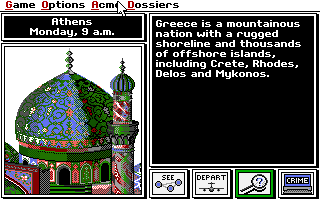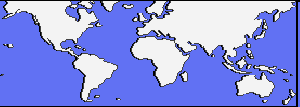tandy put their sound chip on the 1A interrupt?
-
Hah! the game apparently calculates some info ahead of time, but only a few steps. I changed who the suspect was by memory editing, and it didn't take effect... until I got to the third location.
Since I went from a robbery by Fast Eddie B to one by Merey LaRoc, it means the pronouns changed when I got to London.
Congrats on coming out as a trans woman, Merey.
ok I ran my dosspin tool to gibberish every byte of the save game file (it's only 102 bytes, so this is easy!) and none of them change where you start. very interesting... I'm guessing either the values are spread out too much for my gibberishing to reach, or you need to modify multiple bytes at once
-
ok I ran my dosspin tool to gibberish every byte of the save game file (it's only 102 bytes, so this is easy!) and none of them change where you start. very interesting... I'm guessing either the values are spread out too much for my gibberishing to reach, or you need to modify multiple bytes at once
huh, I found a hidden(?) key: if you hold down either shift, it skips all the pauses in the printing. so it goes at MAX CPU SPEED
-
huh, I found a hidden(?) key: if you hold down either shift, it skips all the pauses in the printing. so it goes at MAX CPU SPEED
ahh good. it's always fun to find code that looks like:
do{
while(variable!=0);some one has a custom tick handler that's permutating a global!
-
ahh good. it's always fun to find code that looks like:
do{
while(variable!=0);some one has a custom tick handler that's permutating a global!
can't be threading, this is 16-bit DOS. There is no threading.
-
can't be threading, this is 16-bit DOS. There is no threading.
looking at interrupts, and I think I found a bug.
they set handlers for various CPU errors, but they accidentally set 10 (COPROCESSOR ERROR) twice, instead of the 05 (BOUND check)/10 (COPRPOCESSOR) interrupts they savesomeone copy-pasted and missed a bit
-
looking at interrupts, and I think I found a bug.
they set handlers for various CPU errors, but they accidentally set 10 (COPROCESSOR ERROR) twice, instead of the 05 (BOUND check)/10 (COPRPOCESSOR) interrupts they savesomeone copy-pasted and missed a bit
I finally found the two helper functions they use to get and set vectors!
all the 30 other places I've seen them set/get vectors, they do it manually, but hey, maybe they use the helpers too
-
I finally found the two helper functions they use to get and set vectors!
all the 30 other places I've seen them set/get vectors, they do it manually, but hey, maybe they use the helpers too
could also be that this is a compiler-provided bit of code, which is left in because the runtime needs it, or they just didn't eliminate dead code
-
could also be that this is a compiler-provided bit of code, which is left in because the runtime needs it, or they just didn't eliminate dead code
okay I've figured out there's a shared format they're using here. it chunks the file into chunks, which have a 16-bit ID (unique per file, but not globally), an offset, and 16-bit length
-
okay I've figured out there's a shared format they're using here. it chunks the file into chunks, which have a 16-bit ID (unique per file, but not globally), an offset, and 16-bit length
so like, midisnd.dat will have 12 entries, and the first 11 are 200-500 bytes each, and then the last is 3k.
presumably it's each song and then some config info? -
so like, midisnd.dat will have 12 entries, and the first 11 are 200-500 bytes each, and then the last is 3k.
presumably it's each song and then some config info?cities.dat is very interesting. There's 30 cities in total, but 491 entries in it!
So they must be doing something odd there, that doesn't divide equally. Maybe one city-chunk gives IDs of the others?
-
cities.dat is very interesting. There's 30 cities in total, but 491 entries in it!
So they must be doing something odd there, that doesn't divide equally. Maybe one city-chunk gives IDs of the others?
idea for a test: it's easy to spot which chunk in a city is the image, because it's the biggest. Here's a way to determine if it's looking up by IDs or offsets/indices: swap the IDs of two images
-
idea for a test: it's easy to spot which chunk in a city is the image, because it's the biggest. Here's a way to determine if it's looking up by IDs or offsets/indices: swap the IDs of two images
darn. turns out you can't just renumber the chunks, because they have to be in increasing order.
so maybe I just need to leave the chunk indexes as is, and instead of moving the entries around, I move where they're pointing?
-
darn. turns out you can't just renumber the chunks, because they have to be in increasing order.
so maybe I just need to leave the chunk indexes as is, and instead of moving the entries around, I move where they're pointing?
Bingo! I'm in Athens, but I'm seeing the image for Baghdad, and apparently with the Baghdad palette?
So one of these other chunks must be the palette for a city. Or it selects from a selection of palettes? Maybe they've just got a couple defined.

-
Bingo! I'm in Athens, but I'm seeing the image for Baghdad, and apparently with the Baghdad palette?
So one of these other chunks must be the palette for a city. Or it selects from a selection of palettes? Maybe they've just got a couple defined.

okay I figured out the cities.dat IDs:
They're all 1XXYY (in decimal):
XX is the city number (0-29), YY is the sub-chunk-id.So like:
YY=0: City name
YY=2: City image.They go between 00 and 22, and not all numbers need to be present.
-
okay I figured out the cities.dat IDs:
They're all 1XXYY (in decimal):
XX is the city number (0-29), YY is the sub-chunk-id.So like:
YY=0: City name
YY=2: City image.They go between 00 and 22, and not all numbers need to be present.
hmm, reading a buffer and then summing all the values of the bytes in it.
suspicious behavior.
-
hmm, reading a buffer and then summing all the values of the bytes in it.
suspicious behavior.
okay I think it has a very simple 1-byte CRC check on the chunks, which are optionally not run.
I can't make the math work but I'm reasonably sure that's what it is -
okay I think it has a very simple 1-byte CRC check on the chunks, which are optionally not run.
I can't make the math work but I'm reasonably sure that's what it isokay they're using a blit that's UI-aware, so it starts the coordinate system at (1,13). Fun!
-
okay they're using a blit that's UI-aware, so it starts the coordinate system at (1,13). Fun!
looking into the blitting code I managed to steal the world map out of RAM

-
looking into the blitting code I managed to steal the world map out of RAM

ugh. TODO for my eventual Good DOS Debugger:
Instant Video display.
I don't know exactly how DOSBox-X is doing it, but while single-stepping the debugger, the display never updates. I can dump the ram at A000:0000 and see what updated, but not on the screen in DOSBox -
ugh. TODO for my eventual Good DOS Debugger:
Instant Video display.
I don't know exactly how DOSBox-X is doing it, but while single-stepping the debugger, the display never updates. I can dump the ram at A000:0000 and see what updated, but not on the screen in DOSBoxfound a suspicious array, which goes:
[
(-1,0),
(-1,1),
(0,1),
(1,1),
(1,0),
(1,-1),
(0, -1),
(-1,-1),
(0,0)
]POP QUIZ: why does the font renderer need this array? how are they being "lazy" with this array?